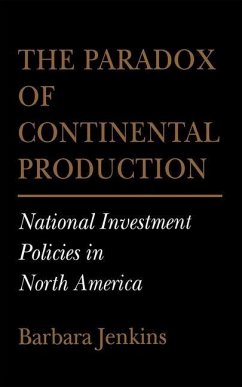Should national governments regulate foreign investment? The question is hotly contested in today's international trade debates. Barbara Jenkins here addresses this complex issue in a timely account of market relationships among North American nations.
Jenkins provides up-to-date, detailed analyses of foreign investment regulations and policies in Canada, Mexico, and the United States. She identifies inherent contradictions in the general tactic that all three countries have pursued-simply relying on the pressures of the market rather than planning active strategy-and she assesses the likely effects on foreign investment of the recently concluded Canada-U.S. Free Trade Agreement and the potential North American free trade agreement. Free trade and the absence of adjustment policy, she argues, expose key political actors such as business and labor too broadly to market forces. The result is a projectionist reaction on the part of these domestic actors, which ultimately defeats efforts to liberalize trade and investment relations.
In current approaches to foreign investment regulation, Jenkins detects divergent trends among the three countries: while Ottawa and Mexico City continue to liberalize their investment strategies, Washington is growing more interventionist. She shows, however, that the interventionism of the United States reflects a nationalistic trend rather than a commitment to a coherent strategy. Cautioning that the conclusion of a North American free trade agreement will only exacerbate the inadequacies of current policies, Jenkins concludes by offering recommendations for future action.
The Paradox of Continental Production will be stimulating reading for policymakers, political economists, and other observers of Canadian, Mexican, and U.S. politics.
Jenkins provides up-to-date, detailed analyses of foreign investment regulations and policies in Canada, Mexico, and the United States. She identifies inherent contradictions in the general tactic that all three countries have pursued-simply relying on the pressures of the market rather than planning active strategy-and she assesses the likely effects on foreign investment of the recently concluded Canada-U.S. Free Trade Agreement and the potential North American free trade agreement. Free trade and the absence of adjustment policy, she argues, expose key political actors such as business and labor too broadly to market forces. The result is a projectionist reaction on the part of these domestic actors, which ultimately defeats efforts to liberalize trade and investment relations.
In current approaches to foreign investment regulation, Jenkins detects divergent trends among the three countries: while Ottawa and Mexico City continue to liberalize their investment strategies, Washington is growing more interventionist. She shows, however, that the interventionism of the United States reflects a nationalistic trend rather than a commitment to a coherent strategy. Cautioning that the conclusion of a North American free trade agreement will only exacerbate the inadequacies of current policies, Jenkins concludes by offering recommendations for future action.
The Paradox of Continental Production will be stimulating reading for policymakers, political economists, and other observers of Canadian, Mexican, and U.S. politics.
Dieser Download kann aus rechtlichen Gründen nur mit Rechnungsadresse in A, D ausgeliefert werden.









